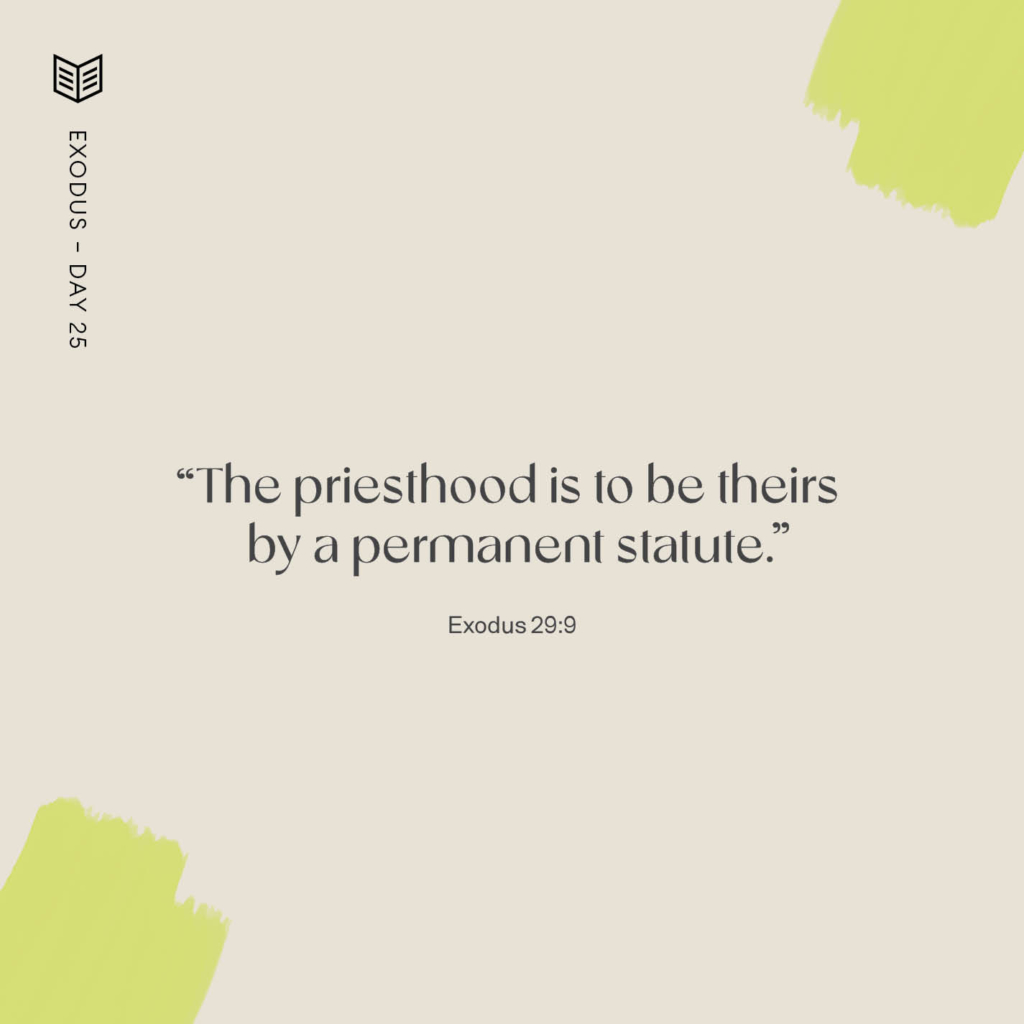Instruction for Consecration
Open Your Bible
Exodus 29:1-46, Psalm 132:12-16, Hebrews 7:23-28
BY Bailey Gillespie
In his poem “How to Be a Poet,” Wendell Berry says, “There are no unsacred places; there are only sacred places and desecrated places.”
Because God created all things—the heavens and the earth—we know this is true. All is inherently sacred. Only sin and evil can destroy and desecrate. All humans bears the imago dei, the image of God. However, today’s passage in Exodus also shows us the importance of consecration to God. The Faithlife Study Bible describes how the Hebrew word used in Exodus 29:1, qadash, “refers to being holy or making something holy.” “The concept of holiness fundamentally indicates separation,” says Faithlife. “Someone or something is set apart for sacred use, as opposed to ordinary use.”
We might think about it this way: Redwood forests stretching along the Pacific Northwest are made by our creator God. They stand as sentinels for us to feast our eyes on. They house birds and other living organisms. They contribute to the flourishing of the Pacific Northwest ecosystem. Each tree, needle, and pine cone has mostly ordinary uses.
But when God instructs His people with a specific task, like preparing a sin offering or ordaining someone to the priesthood, ordinary things are suddenly used for sacred purposes, as we see in today’s act of consecration after the establishment of the Mosaic covenant. Bread cakes and burnt rams become a holy, “pleasing aroma” (Exodus 29:22–25). Garments become holy after being sprinkled with blood (v.21). An altar becomes “especially holy” (v.37).
When Aaron and his brothers are selected as priests, they are now ordinary men set apart for sacred use. They are holy. “The priesthood is to be theirs by a permanent statute,” Scripture tells us (v.9). This new role is meant to be a lasting one, the evidence of God’s redeeming work making its way through His people, moment by moment, beginning in Scripture’s opening pages to the very end. Jesus now holds this role of the High Priest, the One “exalted above the heavens” and the only One truly capable of removing our sin (Hebrews 7:26).
Being set apart by God is not something we take lightly but a sacred and holy calling. Thankfully, we have the testimony of Jesus Christ and the power of the Holy Spirit to help us walk this calling out faithfully. Thanks be to God.

37 thoughts on "Instruction for Consecration"
-
Did you notice in verse 37, whatever touches the altar becomes holy? My expectation would be that the altar would be made unholy but this really shows the power of God’s holiness that everything he touches becomes holy.
-
Today’s reading reminded me of the hymn, “Washed in the Blood”. I’m so glad Jesus was our blood sacrifice for our sins, that he paid the requirement. The killing of an animal was violent! And he did it for us. May our thankfulness never cease as we contemplate his love and sacrifice for us.
-
Crystal H. I am Methodist have been for 66 years. My brother grew up as a Methodist just as I did. He feel out of faith for a while and when he came back, he asked to be Baptized again. He felt the need to cleanse. I have a problem personally with being re-baptized but I don’t feel that way for others. If they feel led to be baptized that’s a decision each person must playfully make. It doesn’t “erase” their infant baptism.
-
Dorothy.. praying your sister gets good results and answers that she needs to heal.
-
Like others have said, I think it’s a great idea. It reminds me a little of all the couples who got married over the pandemic at courthouses and are now having wedding ceremonies to celebrate their union publicly, they aren’t any more married than they were before but now they get to share it with family and friends.
I would however mention it the leader of your church, if it hasn’t been brought up already and make sure you are on the same page before you speak with your kids. Since you said your church has Baptist routes I’d bet it’s fine but I wouldn’t want to ok something and then have the church leader say no
-
Like others have said, I think it’s a great idea. It reminds me a little of all the couples who got married over the pandemic at courthouses and are now having wedding ceremonies to celebrate their union publicly, they aren’t any more married than they were before but now they get to share it with family and friends.



Post Comments (37)